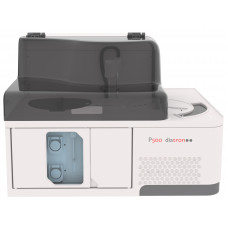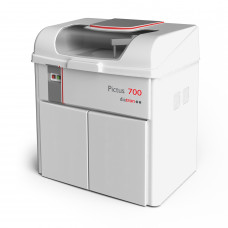Paieška
Bile Acids (in blood)
Šis fotometrinis tyrimas skirtas kiekybiniam tulžies rūgščių kiekiui serume nustatyti.
Paveldimas ar įgytas kepenų funkcijos sutrikimas, t. g. sukeltos infekcijų, metabolinių ligų, vaistų ar toksinų, sukelia pastebimus tulžies rūgšties koncentracijos pokyčius kraujyje.
Tulžies rūgštys kraujyje yra jautrus kepenų ligų žymuo ir tinka ankstyvam e. g. toksinis poveikis kepenims (narkotikai, alkoholis, tirpiklių poveikis ir kt.).
Kartu su gana nespecifiniu simptomų niežuliu padidėjęs tulžies rūgšties kiekis kraujyje apibrėžia klinikinį intrahepatinės cholestazės vaizdą nėštumo metu (ICP).
40 tests
K 7877CV
Bile Acids (in stool)
Šis fotometrinis tyrimas skirtas kiekybiškai nustatyti tulžies rūgštis išmatose.
Jei enterohepatinis tulžies rūgščių perdirbimas nepavyksta, tulžies rūgščių perteklius patenka į storąją žarną ir prarandamas kartu su išmatomis; ši būklė vadinama tulžies rūgšties malabsorbcija.
40 tests
K 7878CV
L-Citrulline ELISA
L-citrulino testo rinkinys skirtas kiekybiniam L-citrulino kiekio nustatymui šlapime, serume ir plazmoje.
Patologiškai didelis citrulino kiekis yra nitrozacinio streso rodiklis.
Indikacijos
• NOS aktyvumo įvertinimas (NO gamyba).
• Nitrosacinio streso nustatymas dėl sustiprinto indukuojamo azoto oksido (iNO) sintezės.
96 tests
K 6600
Pictus P500
The P500 is a bench top, fully automated Clinical Chemistry system with a throughput of up to 340 routine chemistry and 180 ISE tests per hour, state of the art components and user-friendly interface provide a long life platform for analytical excellence. The system includes a full range of reagents, controls and calibrators.
KEY FEATURES AND BENEFITS
- Intelligent software
- High quality components
- Multi-functional pipetting arm
- User friendly interface
- Uninterrupted workflow
- Inventory management
- Remote access & diagnostics
- Cost effective operation
SPECIFICATIONS
- Throughput (tests/hour) Up to 340 tests/hour mono reagent
- ISE: Up to 180-240 tests/hour
- Sample Racks/Positions per rack: 5 / 19
- Samples on-board capacity: 95
- Sample volume (μL): 2 - 200
- Optional direct 4-ISE module
- Reaction volume (μL): 180 - 650
- PMMA reusable/single use cuvettes on board (in segments of five): 80
- Time to first result (seconds): 45
- Serum, plasma, urine, CSF and other sample types can be used
- Refrigerated reagent tray: 8+/- 2 ⁰C
- Refrigerated on-board single reagents/tests: 72
- Water Consumption: up to 2 l/h
- Up to 3 different reagents per test
- Internal Barcode Reader for samples, sectors and reagents
- Crash and collision detection
- Reagent pre-heater
- Clot detection
- QC: Graphical and statistical; Westgaard rules indicated
- Levey-Jennings plots, twin QC and box whisker plots
- Weight: 115 kg
- Dimensions (Width x Depth x Height): 88 cm x 70 cm x 66 cm
OPTIONS
- Optional direct 4-ISE module
- Optional stand/cabinet
- Optional auto fill / drain unit for system wash & waste
P500
Pictus 700
The Pictus 700 is a fully automated, random access, small footprint floor clinical chemistry analyzer. The system can achieve a total throughput of up to 720 tests per hour.
KEY FEATURES AND BENEFITS
- Efficiency – The Pictus 700 incorporates a 95 position patient sample tray reducing the number of required daily runs. It also has programmable auto dilution for out of range tests. The reagents are very stable requiring few calibrations thus saving time and money. The 72 reagent positions (75 w/ISE) and onboard refrigeration allow for many tests to be kept on the analyzer at the same time.
- Cost Savings – The 700 does not need an expensive water treatment that requires expensive upfront cost and continual purchase of filters. More savings will be realized by utilizing low cost reagent, calibrator and controls reducing the overall cost per reportable result. Furthermore, the extended service pricing is comparatively low versus other models of this type.
- Easy to Operate – The Pictus 700 utilizes Windows based software for its operation and is very intuitive with barcoding for sample and reagent identification. It also accepts many sizes of primary tubes. Periodic maintenance is minimal and is easy to perform.
- Space Utilization – The 700, although a floor model, takes surprisingly little space in the laboratory.
SPECIFICATIONS
- Up to 600 tests/hour, max. 720 tests/hour with optional ISE unit
- Sample volume: 2 to 100 μl/tests (in increments of 0.2 μl)
- Sample tray: 95 (5 racks x 19 positions) ID barcode equipped positions for routine
- Stat and control samples and standard solutions
- Maximum number of simultaneous tests: 36 double to 72 single reagent tests, + 3 with optional ISE unit
- 1 to 3 reagents, 2 to 480 μl/tests each (in increments of 1 μl) final total solution volume 180 to 650 μl/test
- Reagent bottle capacities: 72 cooled positions
- Barcode Reader for reagents
- Water consumption: Less than 5 l/h
- Dual beam system
- Automatic pre-dilution and post dilution (ratio 1:5 to 1:100)
- Full quality control: Levey-Jennings plots, Westgaard multi-rules
- Windows-based software
- Power requirements: 110/230 V, 50/60 Hz, 1.4 kVA
- Size (Width x Depth x Height): 97 cm x 67 cm x 100 cm
- Weight: 190 kg
OPTIONS
- ISE Unit - Na+, K+ and CI- measurements. Other electrolytes on request
- PC Requirements- PC compatible with Celeron 2.4 GHz, 256 MB RAM, 40GB Hard Disc or bigger, CD ROM, Super VGA 15” Color screen, with Microsoft Windows™ 8.1 or 10 Operating system.
- Printers - Most printers supported by Windows can be connected. Printouts can be optimized by the customer. Results analysis, work list, patient sample list, quality control, calibration curves and more.
P700
Reagents, Controls, Calibrators and ISE Items / solutions Pictus
The extensive menu of Diatron chemistry reagents offer high quality, long life and exceptional performance. The applications are designed with excellent sensitivity, precision and extended linearity ranges. The reagents are manufactured at an ISO 13485-certified facility, where they undergo extensive QC and performance testing. Each lot is optimized to ensure minimum lot to lot variation and are cross matched to reference calibrators and controls. Most reagents have up to 24 months shelf life, 30 to 60 days on-board, open container stability and long life calibration curves.
KEY FEATURES AND BENEFITS
- Diatron clinical chemistry - liquid and ready-to-use, bar coded reagent vials are specifically designed and optimized for use on the Diatron Pictus analyzers and can be loaded on the system without interrupting its operation.
- Reagent quality and stability that brings you savings! Diatron clinical chemistry reagents are highly stable from 2*C to 15*C and require less frequent calibration than most others. They can remain on-board the analyzer un-capped, ready to use, to ensure the most efficient use of time and offer improved work-flows while delivering first class performance at all times. Extended assay ranges ensure fewer sample repeats, saving laboratory time and costs. All reagents are conveniently barcoded with bottle specific traceability and filled in optimized volumes to virtually eliminate waste. With reduced calibration frequency the lab saves reagent, calibrator and operator time. A full line of verified and cross referenced calibrators and controls in appropriate sizes and formats are also available. Designed to meet global regulatory and compliance standards, the design and performance of Diatron reagents exceed the most stringent customer requirements.
- Special Proteins: Diatron presents World Class performance from an extensive list of special protein reagents that are specifically designed and formulated to virtually eliminate the risk of Prozone/Hook effect from high levels of “antigens or antibodies” in samples. Many other reagents available in the market can be overwhelmed due to their less concentrated formulations and can suffer from “reaction hook effect”. Thus, these more diluted reagents can generate inaccurate/misleading patient results. Another benefit of the Diatron Special Proteins reagents is that they are designed to avoid interference from HAMA (Human anti-Mouse antibodies), RF (Rheumatoid factor) or heterophilic antibodies and are formulated with a unique Ab-latex binding technology that provides the best performance and highest confidence available with any other immune-turbidimetric-based assays. Different kit size options are available to satisfy the needs of small to larger volume laboratories.
- High quality bulk and general purpose reagents are also available on a request.
- Albumin
- Cholesterol
- Creatinine
- Creatinine Enz
- D Bilirubin
- Glucose
- Glucose-UV
- HDL Direct
- LDL Direct
- T Bilirubin
- T Protein
- Triglycerides
- UIBC
- Urea
- Uric Acid
- Urinary Protein (CSF)
- ACE
- ADA
- ALP
- ALT/SPGT
- Amylase
- AST/SGOT
- Cholinesterase
- CK-MB
- CPK
- G6PDH
- g-GT
- LDH L>P
- LDH P>L
- Lipase
- Calcium
- CO₂
- In Phosphorous
- Iron
- Magnesium
- Potassium
- Sodium
- Lithium
- Chloride
- APO A1
- APO B
- ASO
- C3
- C4
- CRP Latex
- CRP
- Cystatin C
- D-Dimer
- Ferritin
- HbA1c
- Hb A1c denaturant
- IgA
- IgG
- IgM
- Lp(a)
- Microalbumin
- RF Latex
- Transferrin
- sTfR
- ACE Cal
- ACE Control
- ADA Cal
- ADA Control
- Apo-A1/APO-B Cal
- APO-A1/APO-B Control level 1
- APO-A1/APO-B Control level 2
- Medi-Cal Chemistry Cal
- CC Control level 1
- CC Control level 2
- ASO Calibrator
- CRP Calibrator
- Ferritin Calibrator
- RF Calibrator
- Protein
- Immunology control 1
- Immunology control 2
- Immunology control 3
- LP(a) Calibrator
- LP (a) control low
- LP (a) control high
- D-Dimer Calibrator
- D-Dimer Control
- CRP Latex Calibrator
- Ethanol Control
- Ethanol Calibrator
- HbA1c Calibrator
- HbA1c Control
- sTFR Calibrator
- sTFR Control
- CK-MB Control
- CK-MB Calibrator
- Cystatin Control
- Cystatin Calibrator
- Ammonia Calibrator
- Ammonia Control
- G6PDH Control
RCCISE





